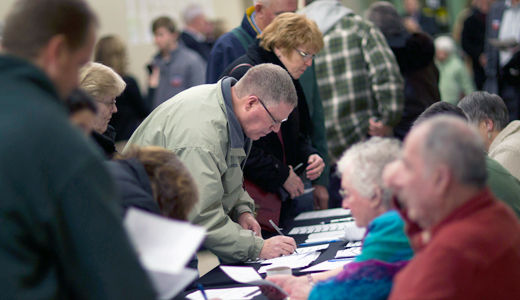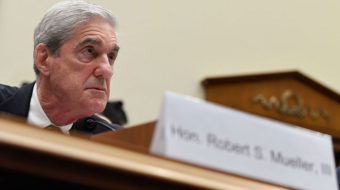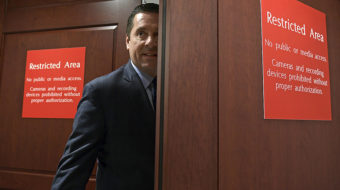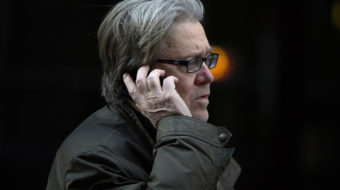
DES MOINES, Iowa – As we from the People’s World cover the caucus here, we wonder: Why is the nation paying so much attention? The correlation between winning in the Iowa caucuses and winning a presidential nomination or election is almost nil.
The answer: it’s like Groundhog Day. Nobody really believes that a rodent’s shadow has anything to do with the coming of Spring, but the Chamber of Commerce of Punxsutawney, Pennsylvania promotes the event big time and the media builds it up in the never-ending quest for ratings.
Like Groundhog Day, the Iowa caucuses are a boon to local businesses. They are run by the political parties themselves and are financed the same way everything done by political parties are financed: through corporate contributions.
For instance, media accommodations here in Des Moines are provided by the Microsoft corporation. The more you pay, the easier the access to newsmakers. The People’s World, needless to say, is in steerage class.
In the 1800s, the political parties in all states chose candidates through caucuses. A few wealthy white guys got together and decided who would get what job.
However, people began to feel that publicly funded primaries with secret ballots were more democratic, so in the beginning of the 20th century, states began to switch to the primary system.
Today, most states hold primaries, financed and regulated by states government. Only 13 have stuck with the caucus system.
Here’s how it works in Iowa: the two political parties hold caucuses in 1,681 locations. This year, they take place Monday, February 1.
You have to be registered as a member of the political party holding a caucus to attend, but other than that how each caucus is run varies greatly. Some have secret ballots; some do not. Some are winner-take-all; some report out exactly how many votes each presidential candidate received.
Most caucuses take several hours. They’re held in gyms, schools, churches, hotels or the homes of individuals. The number of participants vary from two or three to about a thousand.
Technically, caucus participants are not choosing their party’s presidential nominee. They are choosing delegates to represent the presidential candidates at county conventions.
There are 99 counties in Iowa, and thus 99 conventions. These county conventions then select delegates for both Iowa’s Congressional District Conventions and the State Convention, which eventually choose the delegates for the national presidential nominating conventions of each party.
Iowa gets 44 votes at the national Democratic convention and 30 at the Republican convention.
It’s strictly by accident that Iowa hold its caucuses first. Due to the primary reforms after 1968, Iowa Democrats had to change their delegate selection and allocation process, and the Republicans followed suit. A proposed date in June for state conventions to be held in Des Moines was impossible because there were not enough hotel rooms available, and anyway many people had to be doing farm work. That pushed the state conventions back and, with it, the earlier steps in the caucus-plus-convention process.
The Iowa caucuses ended up ahead of the New Hampshire primary.
In the beginning, it didn’t seem to matter. But after the media started to mine the “first in the nation” angle for endless stories and features, Iowa businesses discovered how valuable being first is. They’ve had to fight off other states that have wrangled for the spot.
The media attention has resulted in the public believing that somehow what happens in Iowa portends the future of presidential races. People are led to believe that somehow Iowa represents the “heartland of America.”
If the term “heartland” means “typical,” Iowa is not. The state’s population is less than one third the size of Los Angeles. It’s largely agricultural. It’s 91 percent white, although there is a small but significant Latino community.
Iowa’s governor, senators and three out of its four Congressional representatives are Republicans. Both houses of its state legislature are dominated by the GOP. It’s doing well economically while most of the nation is suffering.
A relatively small number of Iowans take part in the caucuses: party activists and functionaries, and those that have the time and mobility to get to caucus sites.
On the other hand, an argument can be made that the decisions made in the caucuses are worth scrutinizing because participants study the issues and are generally knowledgeable and thoughtful.
This has been borne out by the interviews we’ve done with both Republican and Democratic voters. Their conclusions might be wrong-headed, but they demonstrate good will and a healthy skepticism about the platitudes mouthed by the politicians. Most, even at this late date, say they are “undecided,” are looking behind the rhetoric of political speeches, and are striving to learn the exact programs the politicians propose.
They are not awed by the celebrity of the hopefuls.
In short, the Iowa caucuses don’t have the meaning ascribed to them by the media, but they are not meaningless. The results should be taken with a grain of salt, but they should be taken into account by anybody studying the political mood of America today.
In addition to Larry Rubin, Patrick J. Foote and Earchiel Johnson are on the ground in Iowa. Follow People’s World for more coverage, photos, video and podcast.
Photo: Iowa caucus sign-up. Patrick J. Foote | PW

MOST POPULAR TODAY

High Court essentially bans demonstrations, freedom of assembly in Deep South

UN warns that Israel is still blocking humanitarian aid to Gaza


Resource wars rage in eastern Congo, but U.S. capitalism only sees investment opportunity

U.S. imperialism’s ‘ironclad’ support for Israel increases fascist danger at home






Comments